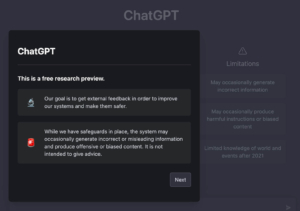Should a Private Practice Owner Use ChatGPT to Write Blogs?
Have you tried ChatGPT yet? It’s an interesting open-source AI tool that was released in November 2022 and has taken the world by storm. Chat GPT has been coming up in many of the recent conversations we’ve had, including with other therapists in the United States. And, our team has been “all hands on deck” investigating this tool. Furthermore, we’ve been internally discussing the pros/cons of suggesting people use this and how to mitigate any risks.
I Asked ChatGPT to Write A Blog Post About Pros/Cons of Using AI for Blog Writing
for Blog Writing
We’ll share a little bit more about what we’ve come up with in another upcoming blog post. In the meantime, I asked ChatGPT to write a sample blog post for me to discuss this topic. My goal in posting ChatGPT’s response below is two-fold: 1) I want you to see an example of the kind of work ChatGPT can do with a carefully selected prompt. 2) This is truly good content that we want to share.

A couple of things to note when it comes to using GPT….
Typically, if our Simplified SEO Consulting were going to use ChatGPT to write a blog post for our own site, we would do a decent amount of personalizing, rewriting, adding, etc. I have not done this below. The only change I made to the content below was to add headings/subheadings so you get a pretty clear picture of what this tool can provide and a couple of minor tweaks for clarity. However, I have read through the content for accuracy/relevance.
Also, I want to emphasize the point about reading through the content for accuracy/relevance. We’ve spoken with people using this new tool (ChatGPT) who have found it creating misinformation (which can happen with other AI tools as well) and sometimes writing things with some bias. In this particular blog post, I didn’t find any misinformation.
In fact, ChatGPT currently has a message on its site reading, “While we have safeguards in place, the system may occasionally generate incorrect or misleading information and produce offensive or biased content. It is not intended to give advice.” So, if you’re going to use ChatGPT, I can’t emphasize enough the importance of checking your content for accuracy and making sure it fully represents you and your brand.
Chat GPT’s Blog Post on Pros/Cons of Using AI to Write Blog Posts
(From here to the next H2 subheading, ChatGPT did the copywriting with Jessica providing careful instructions and reading carefully for the quality of the content before posting.)
Artificial intelligence (AI) has come a long way in recent years and has the potential to revolutionize the way we do things, including writing blog posts. While AI-generated content can save time and effort, it’s important to consider the potential drawbacks and the impact on search engine optimization (SEO).
 Pros of Using AI Such as ChatGPT to Write Blog Posts:
Pros of Using AI Such as ChatGPT to Write Blog Posts:
- Time-saving: One of the biggest advantages of using AI to write blog posts is the time-saving aspect. AI algorithms can analyze a large amount of data and generate content in a matter of seconds, whereas a human writer would take significantly longer to research and write a similar piece.
- Consistency: Another benefit of AI-generated content is the ability to maintain a high level of consistency in terms of tone, style, and formatting. AI algorithms can be programmed to follow specific guidelines, ensuring that the content produced adheres to brand standards.
- Cost-effective: In addition to saving time, using AI to write blog posts can also be cost-effective. AI algorithms don’t require breaks, vacation time, or sick leave, and they can work 24/7 without any additional costs.
Cons of Using AI to Write Blog Posts:
- Lack of creativity: One of the main drawbacks of using AI to write blog posts is the lack of creativity. AI algorithms are designed to follow specific rules and guidelines, which means they may not be able to come up with original ideas or produce content that stands out.
- Quality: Another concern with AI-generated content is the quality of the writing. While AI algorithms have come a long way, they still may not be able to produce content that is as well-written or engaging as content produced by a human writer.
- Legal issues: There may also be legal issues to consider when using AI to write blog posts. In some countries, it is not clear who owns the copyright of AI-generated content. This could potentially lead to disputes over ownership and the right to use the content.
Impact of using ChatGPT & Other AI Resources on SEO:
The use of AI to write blog posts could have a significant impact on SEO. Search engines like Google use algorithms to rank websites based on the quality and relevance of the content. If AI-generated content is not up to par, it could negatively affect the ranking of a website.
Additionally, search engines are designed to identify and penalize websites that engage in spammy or low-quality practices. If search engines determine that a website is using AI-generated content in an attempt to manipulate the ranking, it could result in a penalty or even a ban from the search results.
Potential Solutions to Mitigating Risks of Using AI
One potential solution to the quality and creativity issues with AI-generated content is to use it as a starting point and have a human writer edit and refine the content. This way, the time-saving benefits of AI can be leveraged while still ensuring the final product is of high quality and meets the necessary standards. This approach could also help mitigate concerns about the impact on SEO and potential legal issues. However, it’s important to carefully consider the resources and budget required to implement this hybrid approach.
In conclusion, the use of AI to write blog posts has both pros and cons. While it can save time and effort, and provide a level of consistency, it may lack creativity and the quality may not be up to par with human-generated content. It’s also important to consider the potential impact on SEO and the potential legal issues. Ultimately, it’s important to carefully weigh the pros and cons before deciding to use AI to write blog posts.
Other Ways to Use ChatGPT for Blogging
(This is back to Jessica writing, not Chat GPT)
If you don’t want to take the risk of asking ChatGPT to write a blog for you (or don’t want to have it write one you then have to individualize), there are other ways ChatGPT can be helpful for you as a private practice owner who blogs. A few ideas include:
- Ask ChatGPT to give you a list of blogging ideas related to a topic you want to rank better for. My team and I have found that some of the ideas it gives are really good. In fact, our copywriter said she likes this better that some of the other tools we use to get blog post ideas.
- Ask ChatGPT to write an outline for a blog post you’d like to write. So far, I think this is my personal favorite use. The outlines it’s given me have been pretty good. It usually suggests a couple paragraphs I don’t end up writing and I add in a few of my own. But it’s a great way to at least get started!
- Have ChatGPT to give you several possible ideas for a title for a blog post you’ve written. Another great use as I’ve found the title ideas it gives pretty good!
- Ask it to write a meta description for you. I’ve done this a few times and have personally chosen to rewrite the meta descriptions to be even better. But it has given a basic meta description, so if you’re just starting to optimize your own metas you may find this really useful.
About the Author(s)
First, let’s acknowledge that much of this post (as disclosed above) was written by ChatGPT. That said, Jessica Tappana was very careful in making sure even that content was high quality and helpful to you as a practice owner. She gave it carefully crafted instructions. Then, she read over the post for accuracy. She also added subheadings and made just a couple minor changes for clarity so the content would be useful and applicable for private practice owners. Even when ChatGPT is our second author, we want to emphasize that we’re only posting content that we believe will truly help private practice owners get in front of their ideal clients and add true value for their audience. Jessica, and our entire team, believe in doing SEO and website content in a responsible, ethical way and seek to share content with you that you will find helpful.




Hi,
Has anyone had luck signing up in the past 2 weeks? I keep getting the message that they are not registering new people.
Have others found similar AI companies?
Hi, Lisabeth! We have had some folks that have taken a bit of time to get on, but you just have to keep refreshing. We also have played with a few different AI programs and are hoping to discuss options (and general strategies to use with any program) during our free webinar on February 15th. Stay tuned for more info about this!
New plan! The webinar is on the 13th at 7pm Central time now. 🙂
Hi! I’d love to also see the prompt you used to generate the content. In my opinion that is the most important part of using AI—learning how to prompt and give those careful instructions. I’d love to see what you all did.
Thanks! Great question/point! We’re now going to be doing a free webinar about this on February 15th. Stay tuned!
New plan! The webinar is on the 13th at 7pm Central time now. 🙂
Thanks for this great post. It was fun to read your writing, the AI, then yours again to notice any difference in flow, feel or ‘human-ness’. I’ve always thought AI would be out of my league due to cost and complexity. But maybe this could help take some of the pressure off the how often I blog (if I use it for every 1 out of every 4 blogs I write)… or to make my blog writing a little easier by generating ideas or outlines. Thanks team!
Exactly! I hope it’s helpful for you, Melissa! Jessica is going to be doing a free webinar on it next Monday night, in fact. We’d love to have you there!
Thanks for sharing such amazing information. I hope you keep on sharing such interesting and informative articles.
Well, this is an awesome post and written very well. Your point of view is very good.